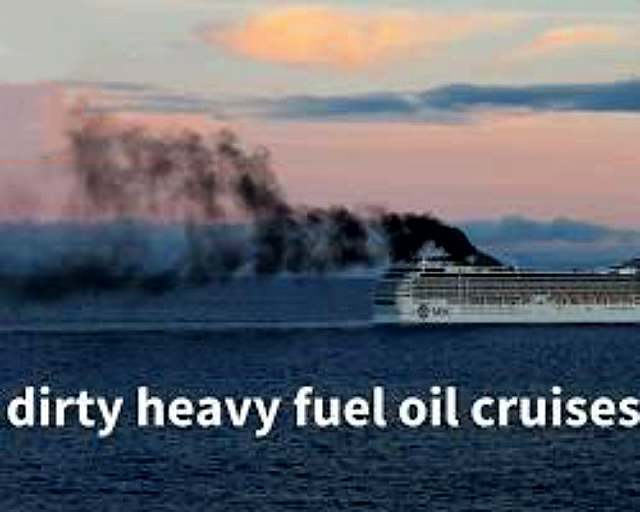Cruise lines are a major source of pollution in the oceans, contributing to environmental damage in various ways
Here's a breakdown:
How Cruise Lines Pollute:
1. Air Pollution:
Heavy fuel oil: Cruise ships primarily run on heavy fuel oil (HFO), which is a dirty fuel that emits high levels of sulfur oxides, nitrogen oxides, and particulate matter. These pollutants contribute to respiratory problems, acid rain, and climate change.
heavy fuel oil cruise ship emissions
Scrubbers: While some cruise lines have installed scrubbers to reduce air emissions, these devices only remove sulfur oxides and do not address other harmful pollutants.
2. Water Pollution:
Sewage and graywater: Cruise ships generate large amounts of sewage and graywater (wastewater from showers, sinks, and laundry), which can be discharged into the ocean if not treated properly. These pollutants can contaminate coral reefs, harm marine life, and contribute to the spread of disease.
Ballast water: Cruise ships take on and release ballast water to maintain stability, which can introduce invasive species to new environments, disrupting marine ecosystems.
Bilge water: Bilge water, which collects in the bottom of a ship's hull, can contain oil, grease, and other contaminants that can pollute the ocean.
3. Solid Waste:
Waste generation: Cruise ships generate a significant amount of solid waste, including food scraps, paper, plastic, and metal. This waste can end up in landfills or be incinerated, both of which have environmental impacts.
Food waste: Food waste is a particular concern on cruise ships, as it contributes to methane emissions and can attract pests.
Why Cruise Lines Pollute:
Cost-cutting: Using HFO is cheaper than cleaner fuels, and discharging waste into the ocean is often cheaper than treating it properly.
Lax regulations: The International Maritime Organization (IMO) sets global standards for ship pollution, but these standards are often weak and poorly enforced.
Lack of public awareness: Many people are unaware of the environmental impact of cruise ships, allowing the industry to continue polluting without facing significant pressure to change.
Why Isn't There More Regulation?
Industry lobbying: The cruise industry wields significant influence and lobbies against stricter regulations.
Flag States: Cruise ships often register under "flags of convenience," which are countries with lax environmental regulations. This allows them to avoid stricter regulations in their home countries.
International cooperation: Implementing stricter regulations requires international cooperation, which can be slow and difficult to achieve.
What Can Be Done:
Regulation: Strengthening international regulations and enforcing them more effectively is crucial to reducing cruise ship pollution.
Cleaner fuels: Cruise lines need to transition to cleaner fuels, such as liquefied natural gas (LNG) or marine gas oil (MGO).
Advanced wastewater treatment systems: Cruise ships should invest in advanced wastewater treatment systems to ensure that sewage and graywater are treated to a safe standard before being discharged.
Ballast water management: Implementing stricter regulations and best practices for ballast water management can prevent the spread of invasive species.
Waste reduction and recycling: Cruise lines need to implement better waste reduction and recycling programs to reduce the amount of solid waste they generate.
Public awareness: Raising public awareness about the environmental impact of cruise ships can put pressure on the industry to clean up its act.
Individuals can also play a role by choosing cruise lines with good environmental records and by minimizing their own waste generation while on board.
Cruise lines do have substantial income, and they could certainly afford to make significant changes to reduce their environmental impact.
However, there are several reasons why they may not be doing enough:
1. Cost-cutting pressures: The cruise industry is highly competitive, and cruise lines are constantly looking for ways to cut costs. Unfortunately, environmental measures can sometimes be seen as an added expense, leading companies to prioritize profits over sustainability.
2. Fear of losing customers: Cruise lines may worry that implementing stricter environmental policies will make their cruises less appealing to customers. They may be hesitant to raise prices to account for the cost of cleaner technologies or stricter waste management practices.
3. Short-term focus: Many companies, including cruise lines, tend to prioritize short-term profits over long-term sustainability goals. They may be tempted to delay investments in environmental technologies in favor of immediate returns for shareholders.
4. Lack of clear regulations: The current international regulations on ship pollution are often weak and poorly enforced. This creates an uneven playing field where some cruise lines can afford to invest in cleaner technologies, while others continue to pollute with impunity.
5. Lobbying power: The cruise industry has a powerful lobby that works to influence regulations and policies in its favor. This can make it difficult for governments to enact stricter environmental standards for cruise ships.
Despite these challenges, there are also some positive signs that the cruise industry is starting to take environmental concerns more seriously. Some cruise lines are investing in cleaner technologies, such as LNG engines and advanced wastewater treatment systems. Additionally, there is a growing consumer movement demanding more sustainable options in the travel industry. This could put pressure on cruise lines to clean up their act in order to remain competitive.
Ultimately, it will take a combination of stronger regulations, consumer pressure, and industry leadership to push cruise lines to become more environmentally responsible. However, there is hope that the industry will eventually recognize the importance of sustainability and take steps to reduce its impact on the environment.








Comments
Post a Comment